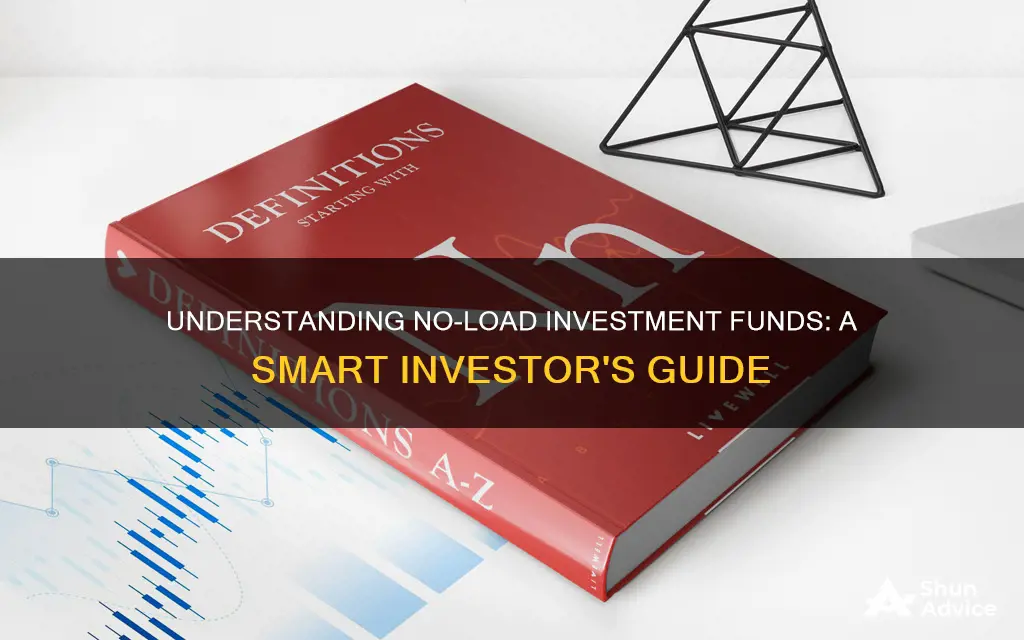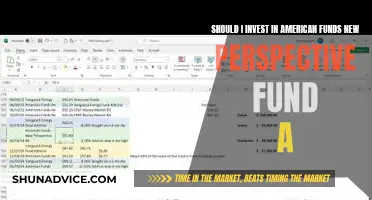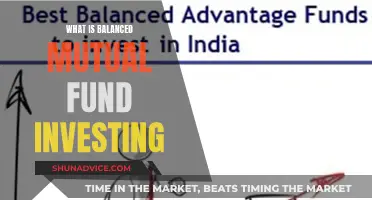
No-load funds are a type of mutual fund that does not charge investors a commission or sales fee when buying or selling shares. In other words, investors do not have to pay a fee to put money into or withdraw money from the fund. This is in contrast to load funds, which charge a load fee or sales commission when investors buy or sell shares. Load funds can be front-loaded, where the fee is paid upfront when shares are purchased, or back-loaded, where the fee is paid when shares are sold. Level-load funds, meanwhile, charge an annual fee for as long as the investor holds a stake. No-load funds are possible because the shares are distributed directly by the investment company, rather than through a secondary party. While no-load funds do not charge sales fees, they may still charge other fees such as management or administrative fees.
| Characteristics | Values |
|---|---|
| Sales charges | No sales charges or commissions |
| Sales intermediary | Sold directly by the investment company |
| Management fees | Annual expense ratio (ER) |
| Management style | Often index funds |
| Suitability | Good for investors who want to manage their own portfolio and keep costs low |
What You'll Learn
- No-load funds are mutual funds that don't charge sales or commission fees
- Over 90% of mutual funds are no-load funds
- No-load funds are possible because shares are distributed directly by the investment company
- No-load funds can still charge fees like redemption or management fees
- No-load funds are often sold through investment companies, not third-party sales firms

No-load funds are mutual funds that don't charge sales or commission fees
No-load funds are a type of mutual fund that doesn't charge investors a commission or sales fee when buying or selling shares. This means that investors do not have to pay a fee to put money into or withdraw money from the fund. This sets no-load funds apart from front-load or back-load funds, where investors are charged a fee for buying or selling shares, respectively.
Most no-load funds are index funds, which are set up to automatically reflect the components of a market index. This approach leaves stock selection to the index managers, allowing the fund to automate things and charge minimal management fees. The no-load philosophy fits well with the index fund method.
No-load funds are important because they offer cost savings to investors. When investors buy shares of a mutual fund that charges a load fee, they incur an extra charge for investing. This fee can eat into returns over time. With no-load funds, investors avoid these fees, meaning more of their money is working for them in the market, potentially increasing their returns in the long run.
It's worth noting that no-load funds are not entirely free of fees. They can still charge other fees, such as redemption or annual management fees, so it's important to understand all the costs involved before investing. No-load funds also charge operating expenses, which are included in the fund's annual expense ratio (ER). These expenses cover the costs of administering, managing, and marketing the fund.
Overall, no-load funds offer investors a cost-effective option for investing in mutual funds, allowing them to avoid sales charges and put more of their money to work in the market.
Global Investment Funds: What Are They?
You may want to see also

Over 90% of mutual funds are no-load funds
A no-load fund is a mutual fund that sells shares without a commission or sales charge. Over 90% of mutual funds are no-load funds. Investment companies usually don't charge a load if they offer the fund themselves, instead of through a broker.
Load funds, on the other hand, charge a commission when you buy into the fund or sell your stake. There are front-load funds, where the commission is charged when you buy into the fund, and back-load funds, where the commission is charged when you sell your stake. There are also level-load funds, which charge fees for as long as you're an investor.
No-load funds are possible because the shares are distributed directly by the investment company, rather than through a secondary party. Because there is no transaction fee to invest in a no-load fund, more of the money you put in is invested. For example, if you invest $10,000 in a no-load fund, the entire $10,000 will be invested into the fund. However, if you invest in a load fund that charges a 5% front-end load, the amount of your stake will only be worth $9,500.
The justification for load fees is that they compensate intermediaries, such as brokers, financial planners, and investment advisors, for their time and expertise in helping you find the right mutual fund. However, some investors find these fees bothersome, and no-load funds have become so common that most fund managers have stopped advertising them as something special.
It's important to note that no-load funds are not entirely free of fees. They can still have expense ratios, which represent the amount of invested capital that goes towards running the fund. However, these fees can be minimized with careful shopping.
The Vanguard Group popularized no-load funds in the late 1970s, and their Vanguard 500 Index Fund is one of their flagship no-load funds. This fund is designed to track the performance of the S&P 500, and it has a low expense ratio of 0.04%. As of July 2023, it had $770 billion in assets under management.
Saudi Wealth Fund: Where is it Invested?
You may want to see also

No-load funds are possible because shares are distributed directly by the investment company
When shares are sold directly by the investment company, the investor avoids paying a load fee, which is a sales charge or commission. Load fees can be applied at the time of purchase, at the time of sale, or as a "level-load" for as long as the investor holds a stake in the fund. These fees are typically used to compensate intermediaries for their time and expertise in helping investors find the right mutual fund. By cutting out the intermediary, investment companies can offer no-load funds, and investors can benefit from cost savings.
No-load funds are important because they offer cost savings to investors. When a mutual fund charges a load fee, it comes with an extra charge for investing, which can eat into returns over time. With no-load funds, investors avoid these fees, meaning more of their money can be invested and work for them in the market, potentially increasing returns in the long run.
It is important to note that no-load funds are not entirely free of fees. While they do not charge a commission or sales charge, they may still have other fees, such as operating, management, administrative, or redemption fees. These fees are typically included in the fund's annual expense ratio, which is the annual cost of owning a mutual fund, expressed as a percentage of the total amount invested.
By distributing shares directly and avoiding load fees, investment companies can offer no-load funds, providing investors with a cost-effective option for building their investment portfolios.
A Beginner's Guide to Mutual Funds Abroad
You may want to see also

No-load funds can still charge fees like redemption or management fees
No-load funds are a type of mutual fund that does not charge a commission or sales fee when investors buy or sell shares. However, it's important to note that they can still charge other fees, and it's crucial to understand all the costs involved before investing. While no-load funds offer cost savings by eliminating sales charges, they may charge other fees such as redemption or management fees.
Redemption fees are designed to discourage frequent trading of funds. If you sell or redeem your shares within a specified period, usually around five years, you may incur a redemption fee. This fee is separate from any sales load or commission and is intended to cover the costs associated with early redemption. These fees are important to consider, especially if you plan on actively trading your investments.
Management fees, also known as expense ratios, are another cost associated with no-load funds. These fees cover the costs of managing the fund, including investment research, portfolio management, and administrative expenses. Management fees are typically charged as a percentage of the total assets in the fund and are included in the fund's annual expense ratio. The expense ratio represents the total annual fees an investor can expect to pay relative to the amount they have invested.
It's important to carefully review the fund's prospectus or online information to understand all the fees associated with a no-load fund. While no-load funds offer the advantage of eliminating sales charges, they may still have other costs that can impact your investment returns. As an investor, it's crucial to consider all fees and expenses to make informed investment decisions and maximize your returns.
In summary, while no-load funds offer the benefit of avoiding sales charges, they can still charge other fees such as redemption and management fees. These fees can impact your investment returns, and it's important to carefully review and understand all the costs involved before investing in a no-load fund.
UTI Transportation and Logistics Fund: Worth the Investment?
You may want to see also

No-load funds are often sold through investment companies, not third-party sales firms
Investment companies that sell no-load funds include Vanguard, one of the world's largest investment management companies, and T. Rowe Price, which has been offering its Balanced Fund since 1939.
No-load funds are possible because they are mostly index funds, which are set up to automatically reflect the components of a market index. This approach leaves stock selection to the index managers, allowing the fund to automate things and charge minimal management fees overall.
While no-load funds do not charge sales loads or commissions, they are not entirely free of fees. They can still charge other fees, such as redemption or annual management fees, and operating expenses. These fees are factored into the fund's annual expense ratio (ER), which covers costs related to the fund's administration, management, and marketing.
The Appeal of Fund of Funds Investing
You may want to see also
Frequently asked questions
A no-load fund is a mutual fund that does not charge a commission or sales fee when buying or selling shares. It is the opposite of a load fund, which charges fees on the front-end, back-end, or annually.
No-load funds make money through management fees and other expenses associated with running the fund, such as administrative and operational costs.
No-load funds offer cost savings to investors by eliminating sales charges, allowing more of their money to be invested and potentially increasing returns over time.
While no-load funds can reduce fees, they may offer a different level of service compared to load funds, such as less advice and guidance. Additionally, investors should be aware that no-load funds may still charge other fees, such as management and redemption fees.
No-load funds can be purchased through various channels, such as through a financial advisor or an online brokerage account, depending on the investor's needs and preferences.







